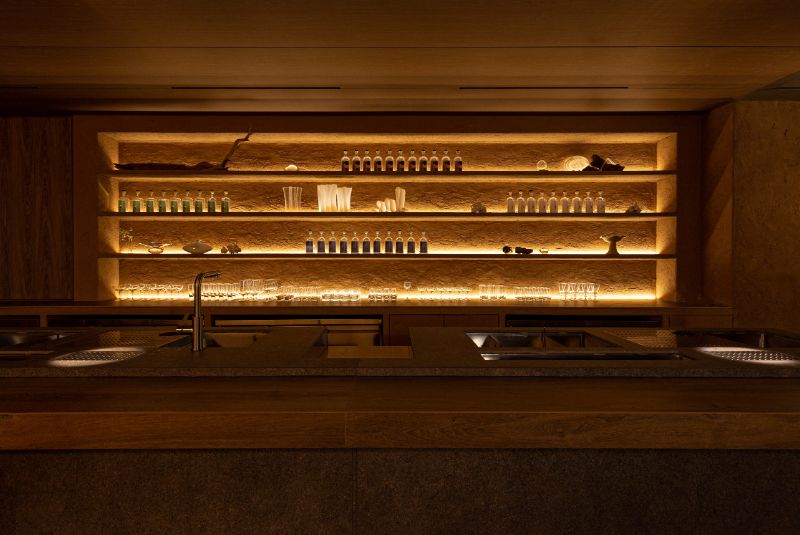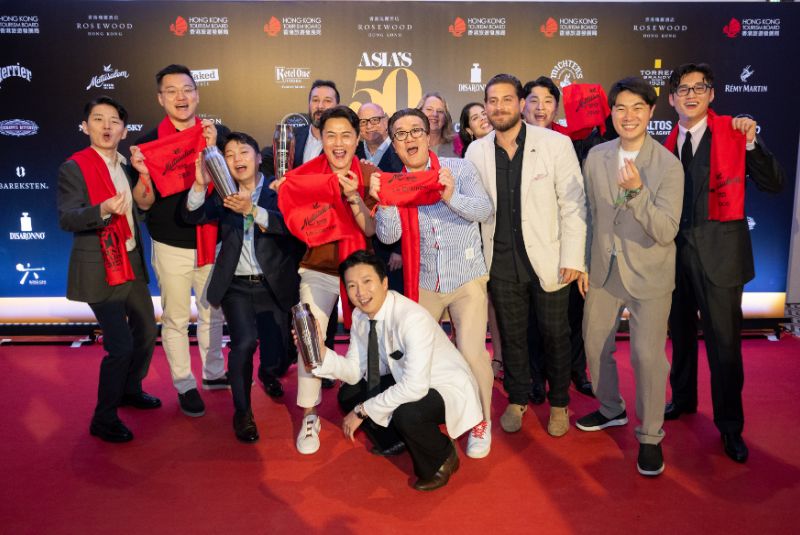Just three years into existence, Seoul’s Zest holds the No.5 spot in Asia’s 50 Best Bars 2023, rising a record 45 places up the ranking to win the Nikka Highest Climber Award. Nick Coldicott joins the team for one of its meetings around a garbage can which, they say, inspires the bar's sustainable philosophy
“It was the right time,” says Demie Kim, regarding his decision to open the bar that would become The Best Bar in Korea and the winner of the Nikka Highest Climber Award as part of Asia’s 50 Best Bars 2023.
Kim had spent six years dreaming of it, honing the idea. When he finished his shifts as head bartender at highly regarded Seoul speakeasy Alice Cheongdam – now called simply Alice, and ranked No.28 in Asia’s 50 Best Bars – he would chug soju with colleagues Sean Woo and Jisu Park, and former college friend Noah Kwon, who was then mixing drinks at the Four Seasons Hotel Seoul.
“If we had our own bar, we could do what we wanted,” he told them. “Put our own values and philosophy into it.” And after many nights of brainstorming, they finally felt ready. The time was right.
Zest was born in 2020 after years of brainstorming by its co-founders while they worked at Asia's 50 Best Bars mainstay Alice (pictured)
Well, perhaps not exactly right. Kim quit his job at the end of 2019; the others followed suit over the next six months. They watched a viral outbreak turn into a global pandemic, “but we thought it would be over quickly,” says Kim.
Then the curfews came. “There were so many regulations,” says Woo. “We thought we cannot open the bar at this moment, but we can delay a little bit.”
A little bit turned into a lot and financial realities forced their hand. Zest opened in December 2020 simply because the four unemployed co-founders needed income to survive.
Starting early
“There was a 9pm curfew at the time,” says Woo. “And you can’t open a bar from 6pm to 9pm; that’s nonsense. So, we opened at 2pm.”
That turned out to be a stroke of luck. Many of Seoul’s best bars are buried underground, out of sight, but Zest is at street level and the fancy new establishment, with its striking minimalist interior of wood, stone and soil, attracted the work-from-home crowd. “There were a lot of people bringing their laptops to Zest and drinking while they worked,” says Woo. “We thought ‘Oh! This works.’”
The interior of Zest stands apart from the stereotypical subterranean saloons of Seoul, opting for an open, modern and minimalist decor
Kim says he had planned to open in the daytime, but assumed it would be something to implement once they were established: “There’s no day-drinking culture in Korea and we wanted to start it. The pandemic gave us a chance.”
It took them just 14 months to debut on the Asia’s 50 Best Bars list, entering at No.48 in 2022. Just one year on, they cracked the top five. “We thought we could reach about 30-something,” says Kim. “But we never expected number five and The Best Bar in Korea – it’s a real honour.” The 43-position rise is a record for 50 Best Bars. Never has a winner of the Nikka Highest Climber crown jumped such a number of places.
“I’m still processing it,” says Woo, who suggests the success is because “Korea is having a moment”. He points to the number of Korean bars on the list and the global popularity of Korean pop and dramas, as well as the growing number of international guests who can speak Korean.
The Korean bar renaissance – establishments such as Alice, Le Chamber and Zest have taken the Asian cocktail scene by storm in recent years
But nobody reaches the upper echelons of a 50 Best list because of location and timeliness alone. Zest – a portmanteau of ‘zero’ and ‘waste’ – is already one of the torchbearers of sustainability in bartending. Taking cues from the likes of Matt Whiley of Re in Sydney, Luke Whearty of another Sydney bar, Byrdi, and Douglas McMaster of London restaurant Silo, the Korean quartet has crafted a unique concept of sustainability.
The trash can as a boardroom table
“We often hold our meetings around the bin,” says Woo. “We look at the waste we produce and say ‘oh, I think we can use that’,” says Kim.
Consider the hallabong, a citrus in the mandarin family that grows on Jeju Island. Along with carrots from the same region, it provides the juice for the Jeju Garibaldi. Once juiced, the peel is used to distill one of the four seasonal house gins, and the pulp that was once thrown away is now used to make cordial or fermented to make what they call Pulp Sauerkraut.
Also in those gins are herbs from local organic farmer Lee Jang-Wuk, based just outside Seoul. Zest team members go personally to pick the produce, eliminating the need for packaging. “In the early days we went to see what he had and used it for garnishes,” says Kim. “But now we’ve changed the menu to create drinks for his produce.”
“We tell him which herbs we might want to use next year and he’ll plant them,” says Woo. “We also construct the texture and the flavour of the produce. So if we say to him, ‘We want this tomato smaller and more condensed,’ he’ll make it.”
One of the bar’s signature drinks, its Z&T, contains a unique tonic, made in-house (as are all their mixers) to eliminate cans and plastic bottles. “Our drink development always starts with the sustainable aspect,” adds Woo.
One of Zest's signature serves, the Z&T, uses tonic produced in-house to eliminate single-use containers from its production
That might mean sourcing honey from urban beekeepers, upcycling spent spices, selecting glassware from local artisans, or incorporating more local brews and spirits. Woo, a certified Korean liquor sommelier, says they want people to look again at indigenous drinks like yakju, a clear rice brew used in their riff on a Gibson, or soju, the local distillate often overlooked by Korea’s cocktail crowd.
For Kim, sustainability goes beyond the menu. From the outset he wanted to build a team with low staff turnover, so he offers flexible schedules, fair wages and ‘personal days’ for his employees. And when Kim explains his vision for a sister bar, he describes it as a place to shunt the co-founders so the other bartenders have a clear career path at the now-famous flagship.
Woo says they also chose the name Zest because it’s vigorous and powerful, but you rarely notice it. It’s the invisible force in your gin, or the twist that leaves a powerful finishing scent long after it’s gone. Just three years into operation, Zest has been voted one of the very best bars in the Asian continent. It’s powerful alright, but far from invisible.
The list of Asia’s 50 Best Bars 2023, sponsored by Perrier, was announced on Tuesday, 18th July, at a live awards ceremony at Rosewood Hong Kong. To stay up to date with all news and announcements, browse the website and follow us on Facebook, Instagram, Twitter and YouTube.

